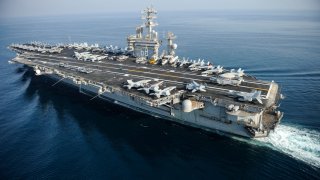America in 2024: Still First Among Equals?
The choice that Washington will face is between continuing to strive for dominance or working together with other powers—NATO in Europe, the Israeli-Arab partnership in the Middle East, and the Quad in Asia—to contain threats to the international system.
If the opposite happens, on the other hand, there is no reason why a more assertive U.S. strategy vis-à-vis Tehran will not allow the Administration to revive its original strategy of co-opting Saudi Arabia into a partnership with Israel aimed at containing Iran and its proxies. This would be all the more meaningful if the Saudis could play a role in the reconstruction of post-war Gaza, together with other Sunni Arab states with a stake in regional stability.
As for the balance with China, it is true that America has been forced to shift more attention and resources in response to the wars in Ukraine and Gaza. This has been a blessing for China since this diverts American focus from the Indo-Pacific region and presumably contradicts earlier American pledges to “pivot” from the Middle East and the Atlantic to the Pacific. That American position, as put forward at the time by Hillary Clinton as Secretary of State, reflected Washington’s recognition that America’s wars in the Middle East had provided an opportunity for China to expand its power while weakening that of America. But things have changed again.
Washington may remain preoccupied with Ukraine and fall into a military quagmire in the Middle East. This outcome could send a message to American allies and partners in Asia, in particular members of the Association of Southeast Asian Nations (ASEAN), that they may not be able to count on Washington for their security and that they, therefore, need to appease China.
Some in Washington are thus concerned that China may take advantage of America’s attention being diverted to Ukraine and the Middle East and use this opportunity to attack Taiwan. But even if that doesn’t happen, the American presidential election would be dominated by attacks on Beijing, with Republicans accusing President Biden of being “weak” on China, which would increase pressure on the Biden administration to strengthen ties with Taipei, a move that is likely to ignite Sino-American tensions. The latter would be inflamed further if Trump -promoting an economic nationalist and anti-China agenda—returns to the White House.
Having said all this, it will remain the case that American policies in the Middle East (and Ukraine) would affect its position in East Asia. An erosion of the American commitment to Ukraine and a failure to contain Iran’s ambitions for dominance will send a message of weakness to Beijing and could encourage it to test American resolve in the Indo-Pacific.
Alternatively, signaling strength, the evolving American strategic cooperation with India, Australia, and Japan—the “Quad”—may become a nucleus of a NATO-like regional security grouping. Together with an Arab-Israeli partnership—expanding the I2U2 or “Western Quad” of India, Israel, the UAE, and the United States, and utilizing Saudi economic power and Israel’s technological edge—this could help shore up the global balance of power in America’s favor. In this context, the initiative put forward by Biden and Prime Minister Narendra Modi of India—to build a rail and shipping corridor linking India with the Middle East and Europe, would fit in as the model of an ambitious project aimed at fostering economic growth and political cooperation, strengthening the American geo-strategic position.
As it enters 2024, the United States has the largest and most advanced economy and by far the largest and most powerful military. Even those cheerleading for China today agree that that country will not become the world’s largest economy before 2050—and even that proposition is very “iffy.” Moreover, no one expects any of America’s potential global competitors (whether friendly like the European Union and India or hostile like Russia and China) to overspend the United States on defense and overtake it in the military sphere any time soon. It just ain’t gonna happen.
It can, therefore, be accepted as a given that there is no great power—or even a combination of powers—ready to challenge the United States for global supremacy at this time in history. At the same time, while the United States will probably remain Number One for quite a while, the trifecta of challenges that it now faces around the world, in Ukraine, the Middle East, and the Pacific, will make it more difficult for the United States to secure its military hegemony on its own.
As a consequence, the notion of a U.S. monopoly in the international system will have to be replaced with the concept of a like-minded oligopoly. The choice that Washington will face is between continuing to strive for dominance or working together with other powers—NATO in Europe, the Israeli-Arab partnership in the Middle East, and the Quad in Asia—to contain threats to the international system. In that case, the United States will be first among equals (or primus inter pares)—aside from being Number One, it’s the next best thing.
Dr. Leon Hadar is a contributing editor with The National Interest, a Senior Fellow at the Foreign Policy Research Institute (FPRI) in Philadelphia, and a former research fellow in foreign policy studies at the Cato Institute. He has taught at American University in Washington, DC, and the University of Maryland, College Park. A columnist and blogger with Haaretz (Israel) and Washington correspondent for the Business Times of Singapore, he is a former United Nations bureau chief for the Jerusalem Post.
Image: Shutterstock.com.

